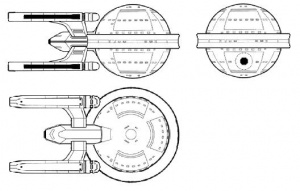Bluebird class
History
The Bluebird class was designed for Starfleet to fulfil the need for confidential material and communiqués that could not be transmitted by subspace communication to be carried securely and safely. Up to this point ships like the modified Defiant Pathfinder had been used to fore fill this vital courier role. The Bluebird class was a cheaper and reliable option to bolster the small number to Defiant Pathfinders.
The Bluebird class took technology and designs that had been incorporated into small ships like the Defiant, Nova and Sabre Classes. The Bluebird class four nacelles design means that it has the ability to cover a distance of 50.5 light years within six days which is the equivalent to Warp 9.982. This distance is achieved by alternating or (Bouncing) the twin matter-antimatter reaction cores and nacelle pairs. This has lead to the phrase of “ Core Bouncing”.
The Bluebird class dose not have a large cargo capacity as compared to other courier. Due to this it was fitted with two sets of twin isolinear processing cores which gave the Bluebird class a capacity of 500 megaquads. This meant that the Bluebird class carries confidential data rather then materials. As well as the computer cores the Bluebird class carries the most up to date sensor package and weapons. This is due to the highly confidential information that the class was out fitted with weapons and armour more suited for larger ships. They also have a squad of marines on board whose purpose is to keep the ship and its contents secure.
In the early 2414, Starfleet looked at overhauling the Bluebird class. The USS Road Runner was chosen as a test bed vessel. Its refit and over haul was extended to incorporate the changes that Starfleet command wanted to incorporate. They wanted to incorporate a surveyor role into its small frame. With the speed and large data storage capacity it was a more cost effective then upgrading larger vessels. The ship’s long range sensors were upgraded along the sensor ring along with its hull, warp engines and impulse engines. The Roadrunner’s computer core was also expanded and a Super-intelligent Artificial Intelligence (AI) Tactical Mission Advisor was integrated into the system.
Technical Specifications
Configurations
Only Configuration: Long Range Courier Ship construction was completed at the Utopia Planitia Yards in orbit of Mars.
Registry Numbers Commissioned:
NCC 924400 USS Bluebird Commissioned 2406.05.04
NCC 924499 USS Hustler Commissioned 2407.01.01
NCC 924600 USS Thunderbolt Commissioned 2407.07.29
NCC 924651 USS Green Monster Commissioned 2408.01.10
NCC 924701 USS Road Runner Commissioned 2408.06.08
Dimensions
Length: 110 m
Width: 32 m
Height: 38 m
Decks: 7
Warp Drive System
Type: 2 Mark XI Compact Warp Drive
Power: Matter/Antimatter
Nacelles: 4
Normal Cruising Speed: Warp 9.5 for 24 hours (Each Core)
Emergency Speed: Warp 9.982 for 12 hours (Each Core)
Impulse Drive Systems
Type: Type IV Impulse Propulsion System (IPS)
Power: Deuterium
No. Engines: 2
Defensive Systems
Phaser Type: Mark XII arrays
Phaser locations: Fore 6 (3 Dorsal 3 Ventral), 4 Pylons (2 Port, 2 Starbord) 2 Aft.
Photon Torpedo Launcher Locations: 1Fore, 1 Aft
Photon Complement: 20
Primary Shields: Standard DEA Auto-Modulation Regenerative Shields
Armour: Ablative Hull Armour.
Tractor Beams: 1 Fore
Transporter Systems and Sensors
Standard (8 Man): 1
Cargo (8 Man Equivalent): 2 (One for each cargo bay)
Long Range Sensors: 30 Light Year Max Range
Takes 1 minute/per light year for intensive scan
Takes 1 second/per light year for standard scan
General scan is almost instant up to maximum range
Auxiliary Craft Carried
Type 6 Shuttlecraft: 1
Escape Pods: 5
Crew Capacity
Normal Complement: 20
Maximum Complement: 25
Maximum Passengers: 5
Maximum Life Support: 30
Misc. Systems
Holodecks: 1
Deck Plans
Deck 1
Bridge, Captains Ready Room, Upper Phaser Arrays.
Deck 2
CO quarters, Shuttle Bay, Officers Quarters, VIP Quarters, Dorsal Sensor Array, Primary Computer Core Upper Deck.
Deck 3
Matter/Antimatter storage, Deuterium Storage Tanks, Hydroponics, Crew/ Marine Quarters, Transporter Room, Away Team Staging Area, SickBay, EMH, Impulse Engine Vectoring control, Auxiliary Power Generators, Primary Computer Core Lower Deck.
Deck 4
Main Engineering, Warp cores, Fore Photon Torpedo Launcher, Torpedo Storage, Aft Photon Torpedo Launcher, Torpedo Storage, Aft Phaser Arrays, Pylons Phaser Arrays, Secondary Sensor Array, Forward Observation Lounge.
Deck 5
Warp Cores Ejection Hatch, Warp Cores Ejection Control, Armoury, Environmental Control, Primary Life Support, Waste Recycling, Stellar Cartography, Secondary Computer Core Upper Deck
Deck 6
Cargo Bay 1/2, Storage Bays, Holodeck, Navigational Deflector Control, Secondary Computer Core Lower Deck.
Deck 7
Ventral Sensor Array, Tractor Beam Emitter Control, Lower Phaser Arrays
